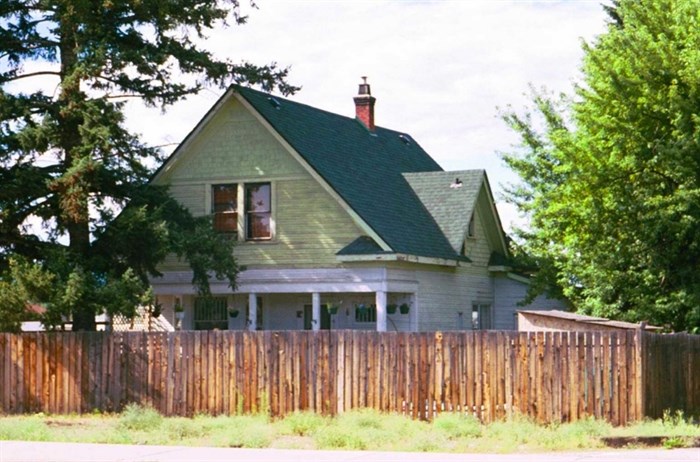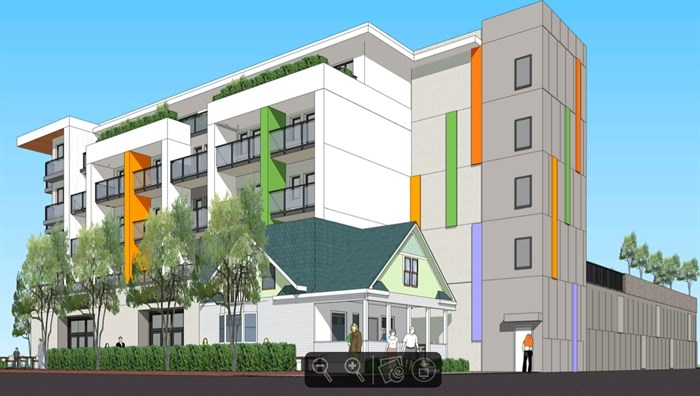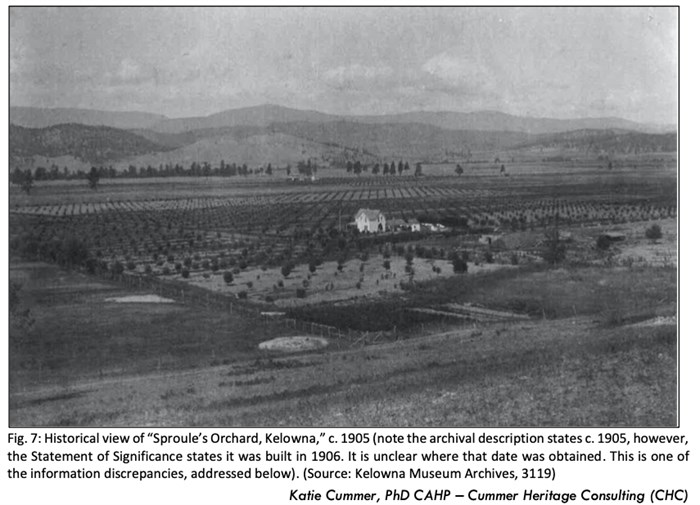
The Sproul Farm House was built in 1906 but has likely been lost to fire.
Image Credit: Submitted/City of Kelownal
October 20, 2020 - 6:30 PM
A vacant home that burned in Kelowna’s Rutland neighbourhood Oct. 18 was more than just a derelict old house.
The Sproul Farm House was one of the few Rutland buildings listed on the City of Kelowna’s Heritage Registry not only for its age but for who built it and lived in it.
Rutland was a mostly rural community and didn’t become part of Kelowna until 1973.
“In the early days, there were big land holdings so you either had that or, in a lot of cases, immigrant families coming in with not a lot of cash so they would build houses that weren’t really of the stature that would survive well,” Don Knox, president of the Central Okanagan Heritage Society, told iNFOnews.ca. “So, the number of really distinguished houses in the Rutland area would be rather small.”
The house was built in 1906 on land originally owned by John Rutland, for whom the community was named.
Brothers Sam and Bob Sproul arrived in the area in covered wagons from the United States in about 1893. Sam bought part of Rutland’s orchard in 1904, hiring noted builder M.J. Curts to construct the “vernacular” style farmhouse, according to Kelowna’s Heritage registry.
Its most recent owner, listed with the City of Kelowna as Studio 33 Properties Ltd., applied to have it demolished in 2018 and was turned down by the city because of its heritage value. Plans were changed to incorporate two walls of the house into a modern five-storey apartment complex.

This is what the proposed new development was to look like.
Image Credit: Submitted/City of Kelowna
It’s unclear at this time whether that’s still possible since the second floor and roof were extensively damaged in the fire.
While the house is representative of a certain style of building with a gabled roof and large front porch, its real heritage value “lies in its being one of the few residences remaining in the area from the early rural period,” the registry states.
But the registry also says it has value because it was sold by Sproul in 1914 to Enoch Mugford who was instrumental in creating the Black Mountain Irrigation District.
The effort to have the house demolished led to a more detailed heritage investigation into the property that shows how cloudy Kelowna’s history can be.
Katie Cummer of Cummer Heritage Consulting, in her 2018 report to the city’s heritage committee, included a 1905 picture that seems to show the house in its orchard even though other records say it wasn’t built until the following year.

Image Credit: Submitted/City of Kelowna
While the city registry says Mugford lived in the house until his death in 1969, that was also questioned by Cummer who speculated the Mugfords lived in another house on the orchard.
At one time, Joe Horning owned the house while his son, former MP Al Horning, built another home in the orchard.
So, while it’s questionable whether Mugford lived in the house, it is known that Hank and Anita Funk eventually bought it, rented it out then used it as the office for his H.R. Funk excavating firm.
By that time, the house at 180 Highway 33 East, near Rutland Road, was really in downtown Rutland.
But the house, by 2018 when Cummer did her report, did not have much to offer.
“Tangibly, the structure itself has certainly seen better days,” she wrote. “A number of changes over the years have compromised the integrity of the building and it has not been particularly well maintained.
“However, that is not to say that the Sproul Farm House is unsalvageable or without significance. In fact, its intangible elements seem to be a key importance of the place. In particular, its location and its association with the pioneers, the Sproul brothers. These are important intangible elements of the building, worth celebrating and promoting.”
The reality is that there are few houses of such an age in Rutland. Cummer mentioned the Willis Schell House at 1024 Rutland Road or the Dudgeon Farm House on Leathead Road as examples of homes that were in better condition.
This past spring the 1871 Fleming House, next to the Brent Grist Mill, also burned. Efforts are being made to preserve some of its timber but it’s another example of the risk of fire to unsecured heritage sites.
READ MORE: One of Kelowna's oldest buildings goes up in flames; Kelowna council's priorities around heritage questioned
“The fact is, when you really get down to it, we didn’t start off with a lot of heritage to begin with,” Knox said. “We lost a lot of it in the 60s and 70s at a time when people just weren’t really aware of the value.
“It gets down to the rarity aspect. I guess a good analogy would be endangered species. Do you let them just go or do you preserve them because of the value they have?”
To contact a reporter for this story, email Rob Munro or call 250-808-0143 or email the editor. You can also submit photos, videos or news tips to the newsroom and be entered to win a monthly prize draw.
We welcome your comments and opinions on our stories but play nice. We won't censor or delete comments unless they contain off-topic statements or links, unnecessary vulgarity, false facts, spam or obviously fake profiles. If you have any concerns about what you see in comments, email the editor in the link above.
News from © iNFOnews, 2020